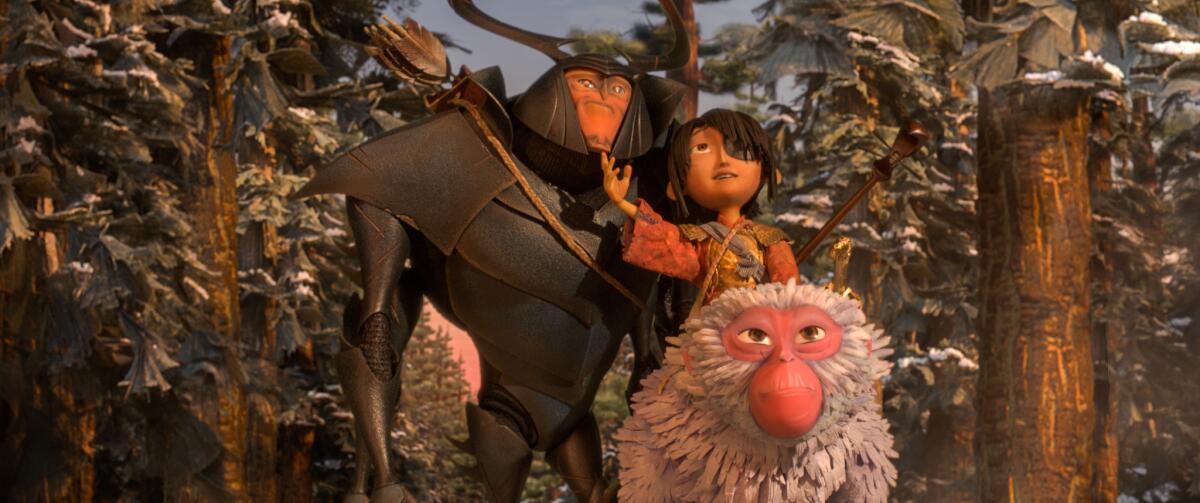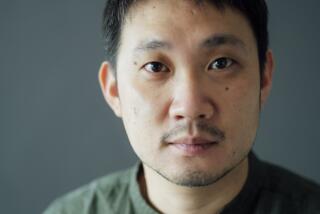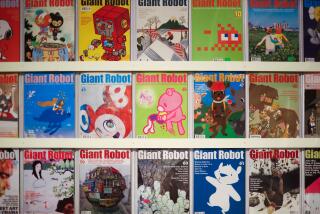Review: ‘Kubo and the Two Strings’ spins a wondrous stop-motion yarn

In “Kubo and the Two Strings,” a 3-D wonderment steeped in ancient Japanese folklore and brought to life by the stop-motion innovators at Laika Entertainment, magic is both an eye-popping phenomenon and an everyday reality. The Kubo of the title is a plucky, imaginative 11-year-old boy with an odd supernatural gift that is wisely never explained: Whenever he plays a melody on his shamisen, sheets of colored paper fold themselves into fantastically detailed creatures that leap, fight and dance of their own accord, illustrating Kubo’s spoken narratives like sentient puppets in a marvelous origami theater.
This playful spectacle — which thrills the friendly inhabitants of Kubo’s village as surely as it will delight the children and adults in the audience — feels like a thinly veiled metaphor for the magic of animation, and particularly the sophisticated stop-motion wizardry that has brought this particular vision to life. Yet the film, though confident of its exquisite artistry, never feels superior or self-congratulatory. It pulls you so effortlessly into its shifting, dreamlike world that you can be forgiven for forgetting that Kubo and the many strange characters he meets are themselves puppets, meticulously designed and manipulated one costly frame at a time.
Like “Coraline,” “ParaNorman” and “The Boxtrolls,” which collectively announced Laika as a vital and distinctive creative force in the increasingly competitive field of big-budget animation, “Kubo and the Two Strings” brilliantly updates stop-motion, a venerable yet time-consuming mode of film production cherished for its hand-crafted, herky-jerky aesthetic. But in the hands of the first-time director Travis Knight and his collaborators, the quality of the animation is so seamless and polished that you have to look closely to notice the telltale lag time between frames.

The trailer for “Kubo and the Two Strings.”
And this is entirely appropriate, since a willingness to look closely, laying aside all doubts and distractions, is crucial to experiencing the full measure of this movie’s strange, hallucinatory power. “If you must blink, do it now,” Kubo (voiced by Art Parkinson) tells us at the outset, explaining that none of what he is about to show us holds any meaning or purpose without the rapt gaze of a spectator.
The recurring references to blinking and eyesight are hardly coincidental. On the most practical level, our eyes are what enable us to enter Kubo’s world and appreciate its myriad visual flourishes, all of which — from the undulating surface of an ocean wave to the gently rippling fur on a monkey’s body — possess a rich, almost metaphysical tactility. But in the film’s most striking moral conceit, they are also the windows that direct our gaze outward, away from our own selfish longings and toward an awareness of our fellow man.
Kubo, though robbed of his left eye shortly after he was born (an injury he conceals with a patch and some pretty rockin’ bangs), has no shortage of empathy. When he’s not hanging out in the village, he dwells in a seaside cave with his mother, who was once a powerful enchantress but is now a somber, grief-stricken shadow. She has just enough strength and lucidity each day to regale her son with thrilling tales about his late, great father, the legendary samurai warrior Hanzo.
Kubo’s mother always cautions him to return home to the cave before nightfall, lest his whereabouts be discovered by his grandfather, the evil Moon King, who killed Hanzo and stole Kubo’s eye 11 years earlier. Warnings like these are of course made to be disregarded, and before long Kubo is fleeing the Moon King and his two vicious assassin daughters (voiced to chilling perfection by Rooney Mara), who are determined to pluck out the boy’s remaining eye. Fortunately, Kubo has friends to help him out, including the stern Monkey (Charlize Theron), a talking simian appointed by his mother to keep him safe, and the good-natured Beetle (Matthew McConaughey), an armor-clad giant insect who happily tags along for the journey.
Movie Trailers
Like any number of films geared primarily toward younger audiences, though with more sincerity than most, “Kubo and the Two Strings” pays tribute to the rich and redemptive power of storytelling. It recognizes that our most cherished legends are an endless source of consolation in times of suffering and loss, as well as a vital repository of cultural and generational memory. If that message sounds trite or familiar, it has rarely been driven home with this much conviction and intensity of feeling.
Attentive cinephiles may detect echoes of the samurai epics of Akira Kurosawa and the children’s adventure sagas of Hayao Miyazaki, which is not to suggest that this English-language movie is exclusively Eastern in either its appeal or its range of references. Knight isn’t afraid to partake of the crowd-pleasing conventions typical of so much Hollywood animation, though he does so with refreshing discretion and purpose: The action sequences, including a clash of swords in a giant skeleton monster’s cave, are staged with unusual clarity and finesse. And the comic-relief banter between Kubo’s animal guardians — one of them stern and overprotective, the other goofy and laid-back — elicits an occasional groan without devolving into aggressively jokey shtick.
The Monkey-Beetle back-and-forth also lays the groundwork for a series of narrative surprises that, by the time they arrive, feel less like major revelations than poignant confirmations of what you may have guessed all along. As scripted by Marc Haimes and Chris Butler, “Kubo and the Two Strings” feels less like a continuous narrative than a series of episodes, each one retelling the same haunting story of loss, remembrance and the legacy that our parents bequeath to us. The story’s origami-like construction is predicated on echoes and repetitions: The more intricately the narrative folds in on itself, the more clearly its larger pattern can be seen.
At times you may wish the movie had declared its themes a bit less emphatically or that its swirl of shifting identities and rejiggered memories adhered to a cleaner sense of narrative logic. You may also wonder whether the story would feel a touch more authentic had it been performed in Japanese, though that would mean losing the warmth of McConaughey’s genial wisecracks, Parkinson’s touching cool-kid heroics and, best of all, Theron’s brittle yet tender display of tough, resilient love.
The movie’s grand theme — that a well-told story can immortalize something that is by nature fragile and impermanent — is distilled into a haunting, fleeting final tableau. It’s gone in the blink of an eye, but just try banishing it from your mind.
------------
‘Kubo and the Two Strings’
MPAA rating: PG, for thematic elements, scary images, action and peril
Running time: 1 hour, 41 minutes
Playing: In general release
More to Read
Only good movies
Get the Indie Focus newsletter, Mark Olsen's weekly guide to the world of cinema.
You may occasionally receive promotional content from the Los Angeles Times.











